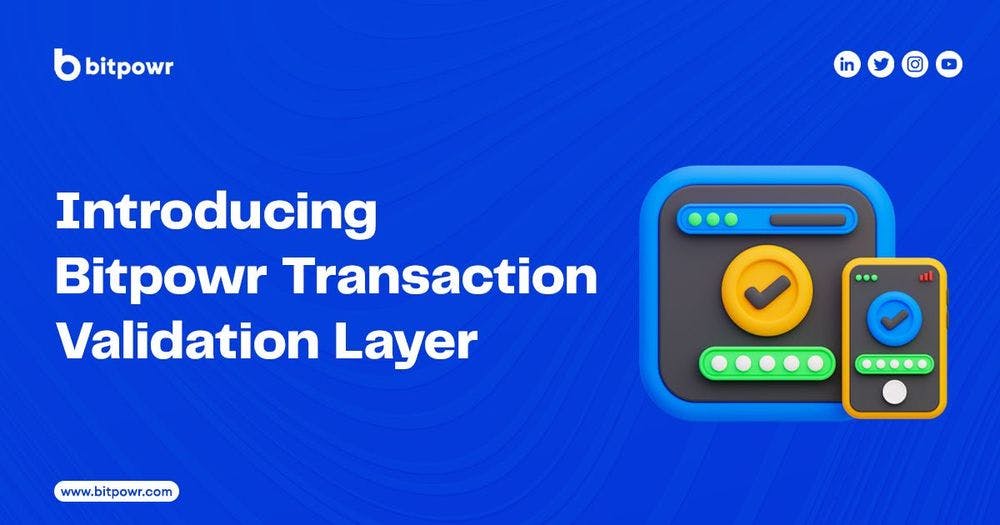Cryptocurrency transactions are a vital part of the digital economy, allowing individuals and businesses to transfer digital assets across the globe with ease. However, the decentralization and anonymity of blockchain technology can also create vulnerabilities, making it easier for malicious actors to engage in fraudulent activity.
To combat this, Bitpowr, a blockchain infrastructure provider, has introduced a new system to validate transactions, prevent fake transactions and improve the overall security of working with digital assets transactions.
At its core, Bitpowr’s system works by using a combination of indexing and tracking to monitor cryptocurrency transactions in real-time from new blocks produced or any unconfirmed transactions present in the Mempool.
When a transaction is initiated and present in the Mempool or a block, the system immediately tracks and indexes it, allowing it to be validated against a series of rules and criteria to ensure that it is a legitimate transaction.
One of the key components of Bitpowr’s transaction monitoring system is the use of indexers to index and track transactions as they occur, decode each transaction’s data, and validate the information decoded.
These indexers primarily monitor each block produced, index the block transactions, and scan through them in real time for transactions related to a specific address. This allows us to detect transactions related to addresses as soon as they occur and prevents transactions from slipping through undetected.
In addition to the monitoring system, Bitpowr introduces a new system that includes a series of validation rules that are applied to each transaction.
These rules are designed to identify common signs of fraudulent activity, such as transactions that involve suspicious addresses (OFAC sanctions or chain abuse reports), suspicious or dangerous methods like (approve), invalid transaction status, and transaction confirmations.
If a transaction is flagged by the validation rules, it is immediately halted and flagged for further review, preventing it from initiating a notification to the customer’s webhook.
Finally, once a transaction has been validated and confirmed, Bitpowr sends a webhook notification to the customer indicating that the transaction has been processed successfully. This notification includes detailed information about the transaction, including the amount transferred, the destination address, and the time and date of the transaction.
Some of the methods that Bitpowr uses to validate transactions include:
Transaction Confirmation: This involves checking whether the transaction has been confirmed by the blockchain network. In general, it’s recommended to wait for at least 6 confirmations before considering a transaction as fully validated. Bitpowr scan transactions from 0 confirmation up to 6 confirmation.
Transaction Validity: Each transaction has a unique hash associated with it, which can be used to confirm that it has been added to the blockchain and not failed or reverted. By validating the hash, Bitpowr ensures that the transaction is legitimate and has been successfully processed.
UTXO Outputs Validation: For UTXO-based blockchains like Bitcoin, Bitpowr validates the output to ensure that the address, amount, and index match what was expected. This ensures that the transaction is sending the correct amount to the correct address.
EVM Input Metadata Validation: For Ethereum-based blockchains that use the EVM (Ethereum Virtual Machine), Bitpowr decodes EVM and TVM inputs data, validates each detail such as the ERC-20 token amount, contract address, contract method, and other vital information to ensure that the transaction is legitimate. Bitpowr also checks for the status of the transaction ensuring it was not rolled back or failed on the chain.
AML Scan: Bitpowr also performs additional checks by scanning addresses against databases like the Office of Foreign Assets Control (OFAC) and ChainAbuse to ensure that they are not associated with fraudulent or illegal activities. This provides an extra layer of security, helping to prevent transactions with known bad actors and reducing the risk of fraud and other malicious activities.
By combining these methods, Bitpowr is able to validate transactions in real-time, preventing fraudulent activity and ensuring that customers receive accurate and reliable notifications about their transactions. This approach helps to build trust and confidence in the blockchain network, making it easier for individuals and businesses to transact with confidence in the digital economy.
Overall, Bitpowr’s system for validating transactions to prevent invalid or fake transactions is an important step forward in improving the security and reliability of cryptocurrency transactions. As the digital economy continues to grow, solutions like Bitpowr’s will become increasingly important for ensuring the safety and security of digital assets.




